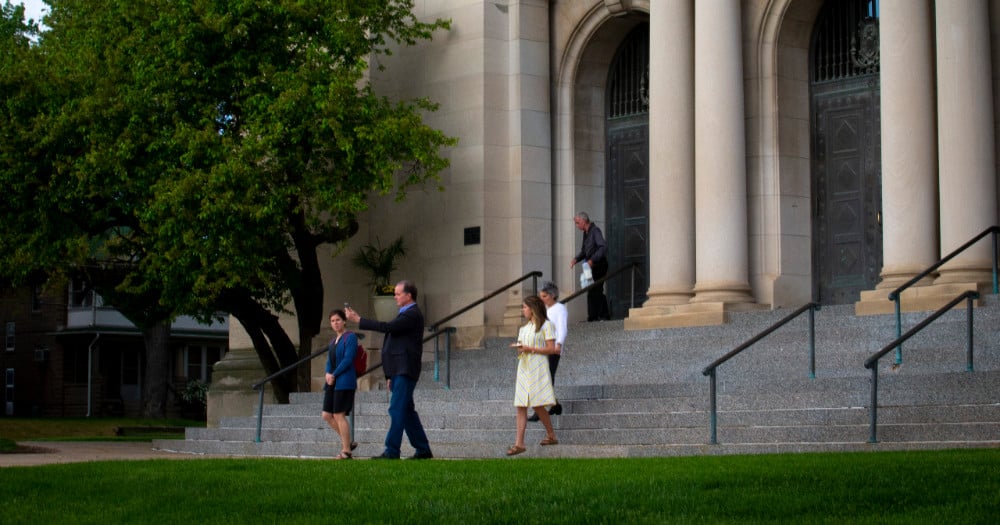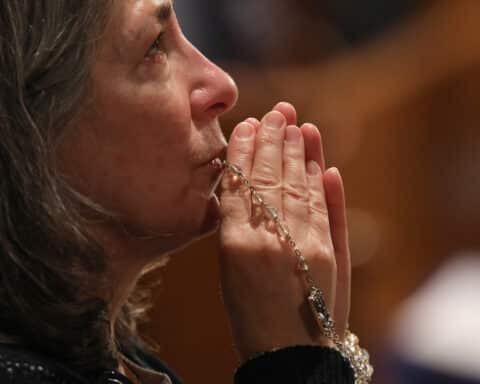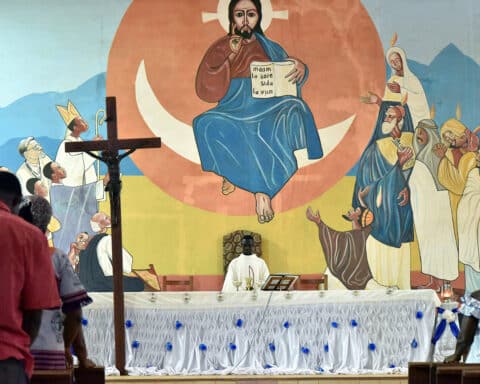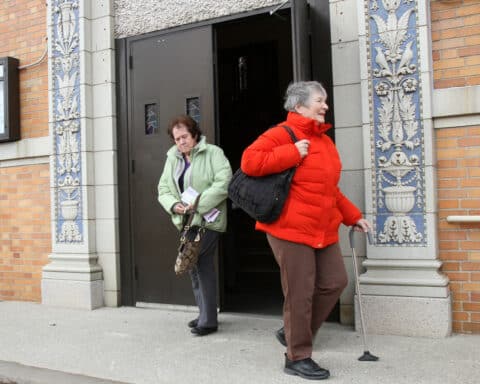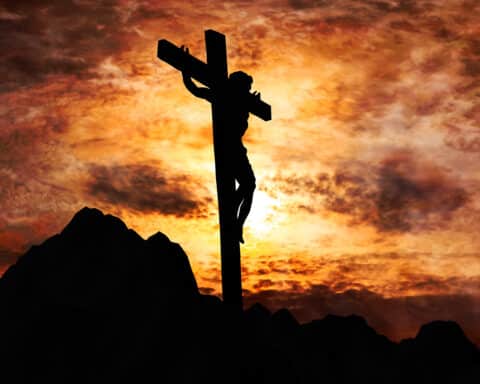On Corpus Christi Sunday earlier this year, the U.S. Conference of Catholic Bishops initiated a three-year Eucharistic Revival. Part of this effort is to renew Church-wide focus on respect for the Eucharist. One simple way we can all show our respect for this most precious gift is to arrive at Mass on time and stay until the celebration is complete.
Did you ever notice people leaving Mass before it’s over? For the new convert, this is a great surprise, seeing someone receive holy Communion and then walk right out of the church. The convert has been told repeatedly that the Mass and, specifically, receiving the Eucharist, is the center of Catholic life, the supreme act of adoration and that attendance at Mass is a grave obligation. How, then can a Catholic deliberately miss any part of it?
There is a story that at Mass one morning a priest watched a lady receive holy Communion and then head toward the parking lot. The priest sent two servers carrying candles to walk beside her as she was still a tabernacle of Christ. She stopped leaving early.
Watching a person leaving immediately from holy Communion, you wonder if the person is sick. Was there an emergency? But no, after a while, you realize that the situation is not uncommon. Much like habitually arriving late for Mass, it may be discourteous, impolite and irreverent, but it is not uncommon.
One parishioner was heard to say that her family attended the 11:15 Mass. There is no 11:15 Mass. She laughingly explained that her family always arrived 15 minutes late — every Sunday. Are these folks also always 15 minutes late for a doctor or dental appointment or to the school bus stop?
In the course of events, it seems odd that we can’t organize our lives in such a way that we can attend Mass in its entirety. It isn’t as if we are spectators at a stage play or ballgame and decide to show up at the bottom of the second inning or arbitrarily leave before the event is over. At the play or the game, neither the actors nor the players leave before the curtain goes down or the last out is made. Similarly, they are on hand when the curtain goes up or the first pitch is made. During the Mass, we are the players; we are the participants.
| St. John Vianney — Time After Communion |
|---|
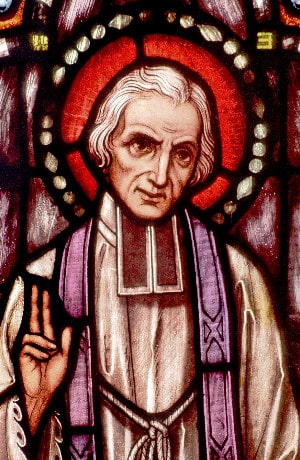 The patron of parish priests, St. John Vianney, had this to say about the time after Communion: “After you have had the wonderful happiness of receiving Holy Communion, you should rise with modesty and return to your place. You should stay a moment with our Lord Jesus Christ, Whom you have the joy of having in your heart, where, for a quarter of an hour, He is present in both Body and Soul as during his mortal life. Oh, infinite happiness! Who will ever understand it? Alas! Hardly anyone understands it! After you have asked God for all the graces you desire for yourself and others, you should then take up your prayer book again and continue to use it. After saying your Acts after Holy Communion, you should invite the Blessed Virgin and all the angels and saints to thank God for you. You should be careful not to spit, at least for a good half-hour, after receiving Holy Communion. Do not go out immediately after holy Mass but stay a moment to ask God to give you plenty of strength to keep to your good resolutions. When you go out of the church, do not delay to chat. You should think about the great joy you have had in receiving Jesus Christ and make your way home” (“The Sermons of the Cure of Ars,” Una Morrissy, Roman Catholic Books). |
If we are invited into the presence of a president, a queen or the pope, wouldn’t we arrive before the dignitary and stay until the function is complete? It’s protocol, respect and good manners. Doesn’t God our creator, who gave his life for us, deserve the same respect? What if Jesus asked us to attend the Last Supper; would we come late or leave before the meal was over? The Mass begins with the entrance procession and hymn. It ends with the dismissal. Everything in between is the Mass.
There was a time in Church history when people rationalized that their Mass obligation was satisfied if they attended the offertory, the consecration and holy Communion. Any such thinking was eliminated with the Second Vatican Council. Sacrosanctum Concilium (the Constitution Of the Sacred Liturgy), reads: “The two parts, which in a certain sense, go to make up the Mass, namely, the liturgy of the word and the eucharistic liturgy, are so closely connected with each other that they form but one single act of worship. Accordingly this sacred Synod strongly urges pastors of souls that, when instructing the faithful, they insistently teach them to take their part in the entire Mass, especially on Sundays and feasts of obligation” (No. 56).
The Code of Canon Law likewise claims, “On Sundays and other holy days of obligation the faithful are obligated to assist at Mass” (No. 1247). And the Catechism of the Catholic Church, No. 2180, repeats the exact words of canon law regarding our Mass obligation. The first precept of the Catholic Church also tells us that we are obligated to attend Mass on Sundays and holy days of obligation. There is no ambiguity here. None of these documents even hint or remotely infer that we can arrive late or leave early or that it’s somehow OK to miss part of the Mass. In the words of Yogi Berra, “It ain’t over till it’s over.”
Ignoring the mentioned documents and laws of the Church, there are other reasons for arriving on time and remaining until Mass ends. Those moments before Mass when we walk into this holy place, go to our knees before the throne of grace and revere our merciful God are moments to express our love. This is a time of personal preparation to meet God in the Eucharist. Likewise, the time after participation in holy Communion is a special period of reflection. We have just received the body and blood of Christ and to simply walk out makes a mockery of this glorious treasure. By showing up late or leaving early, we not only trivialize the real presence of Jesus, not only trivialize the Eucharist, but we also miss the full richness of the Mass. It is also a sign of rudeness to the celebrant, the servers, the ministers — all those who help orchestrate the Mass.
Pope St. John Paul II, in a May 31, 1998, apostolic letter titled “On Keeping the Lord’s Day Holy,” wrote: “Like the first witness of the Resurrection, Christians who gather each Sunday to experience and proclaim the presence of the Risen Lord are called to evangelize and bear witness in their daily lives. Given this, the Prayer after Communion and the Concluding Rite — the Final Blessing and the Dismissal — need to be better valued and appreciated, so that all who have shared in the Eucharist may come to a deeper sense of the responsibility which is entrusted to them. Once the assembly disperses, Christ’s disciples return to their everyday surroundings with the commitment to make their whole life a gift, a spiritual sacrifice pleasing to God (cf. Rom 12:1). They feel indebted to their brothers and sisters because of what they have received in celebration, not unlike the disciples on the Emmaus Road who, once they had recognized the Risen Christ ‘in the breaking of the bread’ (cf Lk 24:30-32), felt the need to return immediately to share with their brothers and sisters the joy of meeting the Lord (cf Lk 24: 33-35).”
We know we will meet the Risen Christ in the holy sacrifice of the Mass; how can we miss any part?

